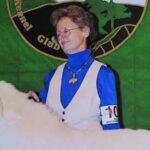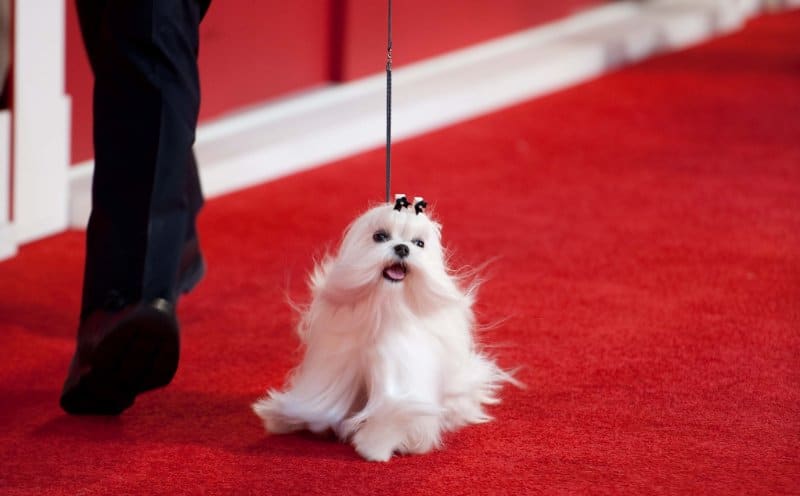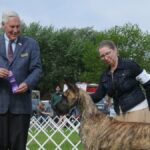In last month’s article titled, “Getting Lucky in 2023,” I offered a few suggestions aimed at Owner Handlers who are looking to achieve greater success in the year ahead. Although my intention in writing the article was to challenge exhibitors to reevaluate current strategies that might not be working, at least one reader took offense to my unsolicited advice. The feedback I received, though strongly-worded, was enlightening and has prompted me to give the subject “another go” this month. (Perhaps I’m just a glutton for punishment?)
As with my January article, the following stories are offered here with one goal in mind: to encourage Owner Handlers to become more successful. They are being offered without judgement. These recollections are based on my own experiences as an Owner Handler of several breeds for nearly four decades. My hope in sharing a few of my stories is that readers might better understand their own experiences and realize that every dog—and every dog show—brings unique challenges as well as the possibility of greater personal insight.
Teala (Irish Water Spaniel)
My first show dog finished her championship by going Best of Breed from the classes in one weekend at a pair of shows with breed-supported entries. As impressive as this accomplishment might sound today, I have to admit that I was unaware of its significance at the time. In fact, when Sunday’s judge pointed our way and the other exhibitors began to congratulate us, I didn’t understand what all the fuss was about. I was oblivious. I even needed to be told—again—where to stand to collect the purple and gold ribbon.
On the long drive home, the reality began to sink in that “Teala” was now a champion of record and would no longer be eligible to compete in the classes. From that day forward, she would have to be entered as a special if I wanted to continue showing her. (The year was 1986, so grand championships and the NOHS were not in the offing.) The only option was to hope to get her into the Group ring where she would compete against mature dogs with experienced handlers. Since I enjoyed showing so much, that is what I chose to do.
In the weeks and months that followed, Teala was presented to a variety of judges. None, however, gave her a second look. Not one. Despite having finished her championship in style, my favorite dog and constant companion went unnoticed among each and every collection of Sporting Dogs. Weekend after weekend, we’d exit the ring without a shiny new rosette. After one particularly memorable defeat, I was approached by a few exhibitors who wondered why my dog always “walked” out of the ring. Well, I was wondering the same thing too, and so I went back to the AKC Breed Standard to see if there was something I was missing.
As I compared my two-year-old champion to the Standard, I couldn’t really fault her. She possessed the silhouette, head, coat, movement, and temperament as described. I was presenting her in a breed-specific manner and yet she still remained invisible. So, why wasn’t she winning? What exactly was the problem? Well, it was only after I’d decided to stop showing her that I understood her shortcoming: although my champion may have been a standout in the Breed ring, the sum of her individual “parts” didn’t quite equal an undeniable “whole.” Teala, for all her charm and “standardized” beauty, was never going to cut it in the Group ring.
What exactly was the problem? Well, it was only after I’d decided to stop showing her that I understood her shortcoming: although my champion may have been a standout in the Breed ring, the sum of her individual “parts” didn’t quite equal an undeniable “whole.”
Fortunately for me, Teala had plans of her own. With the help of a few friends, she earned her CD title and had two litters. As the dam of eight champions, she earned recognition as a top producer. Several of her get even became Group winners (perhaps in honor of their mother who had tried and failed). As the years went on, Teala matured both physically and mentally. As a seven-year-old, she won Best in Veteran Sweepstakes and Best of Opposite Sex at the national specialty.
These later-in-life experiences taught me several valuable lessons that have directed my involvement in the sport ever since. The first lesson is to be patient. Good dogs take time to become great. Secondly, it’s the competition in the Breed ring that matters most to me. And finally, a purebred dog’s true worth is measured in puppies that grow up to become better than their sire or dam.
Barnum (Rhodesian Ridgeback)
On Halloween 1999, a litter of “African Lion Dogs” was whelped in the suburban home of my sister. I co-owned the dam with Eileen and her husband, together with the dam’s breeder, and delivered a healthy litter of ridged beauties as the local trick-or-treaters absconded with 10 pounds of candy from a basket sitting on the front porch. “Kyra” had been my introduction to this extraordinary breed and finished her championship, owner-handled, when she was awarded three majors in one weekend, the last under the breed’s longest-serving breeder-judge. (Kyra’s turbulent journey from willful puppy to conformation champion is a story for another day!) Among the litter of pups born that night was a red wheaten male who was destined to provide me with one of the hardest lessons in dogs I have ever had to learn.
“Barnum” was a standout from the very beginning. He was one of those puppies that appeared to “have it all” from birth. As he grew and discovered his legs, Barnum moved through his world with the athleticism and grace of a gold medal-winning Olympian. It’s a cliché to assert this claim, but the little guy never put a foot wrong. On one otherwise uneventful afternoon, my brother-in-law and I were sitting in the family room when ten-week-old Barnum trotted in one doorway, crossed the floor in front of us, and trotted out the other doorway. Brian and I turned to look at each other and simultaneously asked, “Did you just see that?” In that moment I thought to myself, “I’ve got my first Best in Show winner.”
Like Kyra before him, Barnum was enrolled in puppy socialization classes followed by his first show handling class at the local kennel club. However, unlike his dam, this “star in the making” didn’t seem to possess his mother’s desire to shine brightly in the ring. In fact, at his second class, Barnum seemed to shrink at the instructor’s approach and no amount of support from me could help. As classes progressed, his confidence only diminished as my frustration with him grew. I began to view his resistance as an affront to his dam’s legacy. Without understanding it at the time, I had started to put undue pressure on the pup. My thoughts and feelings about our relationship, and my desire for a Best in Show win, were preventing either one of us from having fun. I was blinded by my insistence that he become a star.
Barnum did eventually accept my request that he “stand-stay” and so we entered him in two all-breed shows. His ring debut, however, was less than stellar. On Saturday he did well enough, but on Sunday he became insistent and resisted my feeble attempts to keep things together. I became exasperated and asked my sister, “Why can’t he simply stand still?” I didn’t understand the dynamic that I’d created with Barnum and, quite frankly, I couldn’t accept that I had come to resent him for his stubbornness. (How could he ever “shine” when he knew I resented him?)
When I showed him in the Bred-By Class at the national specialty under Anne Rogers Clark, he did well enough but he took a step back as she approached. I interpreted the expression on the acclaimed judge’s face as one of supreme disappointment. Although Barnum did not place in his class, Mrs. Clark chose to keep him, and only him, in the ring as her “fifth choice.” Maybe there was hope for us after all?
In time, it became clear that my dream of going Best in Show with Barnum was exactly that—a dream. Because of my high expectations for him (an expectation for which he hadn’t been consulted) Barnum needed another handler if he was going to earn his championship. Thankfully, he had a true friend and supporter in a woman who owned his litter sister. Unlike the transactional relationship that I had developed with my dog, Denise brought no expectations whatsoever. She gladly took Barnum’s lead and showed him in the manner he needed—calmly and without undue pressure. The pair immediately began to win, and I’ll always remember watching Barnum (from ringside) win his first Hound Group.
At another national specialty under Michele Billings, Denise even piloted Barnum to Best of Winners and First Award of Merit to finish his championship. To my surprise, I wasn’t envious that it wasn’t me showing him to these wins. My previous feelings of frustration and loss had been replaced by those of humility and gratitude, and a greater understanding that my ambitions as an Owner Handler have nothing to do with my dog’s merit and everything to do with my foibles as a human being.
Oscar (Sussex Spaniel)
I’d always wanted a Sussex Spaniel ever since I first saw one in a 1980s Sporting Group. That was a very rare occurrence in the days before the breed had become a serious contender at Westminster. As it so happened, a Sussex did earn a Group placement at that historic New York City show around the same time that I got a call from a woman who bred the long, low, and level Spaniels. This lady had a bitch puppy she was growing out and wondered if I might like to dog-sit for a while as the pup’s bite decided what it wanted to do. “Just to see if you like the breed,” she insisted. Well, “Misty” made her mark in my heart before she was returned to her breeder as we’d agreed. Now all I wanted (needed) was a Sussex!
In a few years’ time, an older male puppy eventually became available from the same breeder. Due to changes in her personal life, the lady was considering placing the pup and brought him to a show for me to meet him. “Gibson” was introduced on-lead by the woman’s six-year-old daughter who moved the dog for my benefit with ease. That was all it took! I had to have this exquisite pup with the effortless movement, gorgeous coat, and silly expression. Other than his ownership on paper, the only thing that had to change was his name. For reasons I still don’t understand, I wanted to change his name to “Oscar.”
Living with a Sussex Spaniel was a lot of fun. Oscar was an extrovert with a capital “E” who never met a stranger. He relished greeting every person and dog he encountered, and every cat, squirrel, and bird was his friend. He loved puppies and helped to raise a litter of Ridgebacks, and he even enjoyed going to handling class. (In those days, Sussex were examined in the ring on the ground/floor; however, Oscar was so used to being on the grooming table with the Irish Water Spaniels that he would have happily been examined on a table or ramp or a teeter-totter, for that matter.) Every day with Oscar was a blessing because he brought so much joy to the world—my world, especially.
Every day with Oscar was a blessing because he brought so much joy to the world—my world, especially.
After a few months together, it came time to enter my new pal in his first show. I’d expected Oscar to be the only entry in his breed, but as it turned out there was another class dog entered that weekend. On Saturday, as the two dogs gathered ringside, I did what I’ve always done and silently evaluated the competition. Though immature, both dogs were quality animals with distinct differences in type.
Depending on the judges’ interpretation of the Breed Standard, and their personal preferences, the results for the weekend could go either way. As Oscar’s class was called, we entered the ring together and he proceeded to drop his head. Like Barnum, he appeared to be unsure of himself. In that moment, I realized that by stepping into the ring I had shifted my energy from “let’s have fun” to “we need to win this at all costs.” I tried to lighten the mood but it was too late. We didn’t go Best of Breed that day; another debut dashed by my unrealistic expectations.
Oscar was never again defeated in the classes. I kept the pressure off him (and myself) and he eventually earned a few single points toward his championship. Getting his majors was another matter altogether, requiring a considerable investment as we crisscrossed the country in hopes that a 3-point major would hold. Eventually, Oscar did earn his majors, the second at a show in Kentucky where the heat and humidity nearly destroyed us both. (The conditions were so hot that I chose to save us from the ordeal of standing around for a win photo.)
Now a champion, Oscar matured beautifully and earned Group placements from both AKC and international judges. Unfortunately, he never passed along his wonderful temperament. He was used at stud three times, but each of the bitches failed to produce any puppies. A trip to a repro vet confirmed that my beautiful boy was sterile—a condition not unheard of in animals with gene pools as small as the puddles that Oscar always managed to find on our walks around town.
Every dog that we choose to show provides us with new adventures that can transform our experiences as Owner Handlers—and as human beings. Sometimes our efforts go according to (our) plan. At other times we are challenged to accept the fact that life can be unfair and things don’t always go our way. Thanks to dogs like Teala, Barnum, and Oscar, I’ve come to understand that, for me, genuine success is defined by the many lessons I’ve learned with my dogs as my guides.









